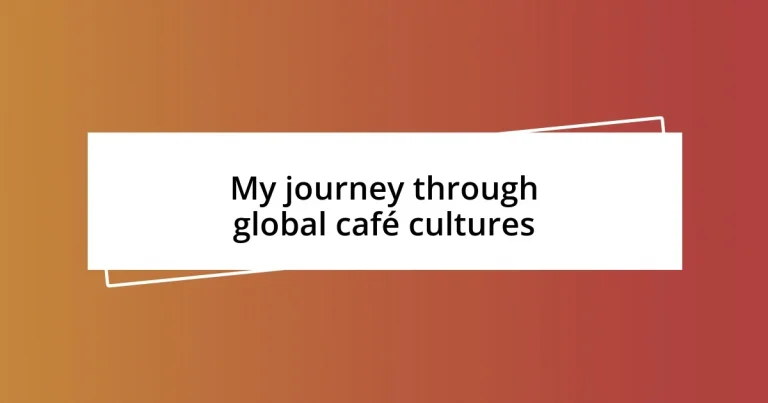Key takeaways:
- Cafés serve as crucial social hubs and cultural showcases, highlighting local traditions while fostering community connections.
- Unique coffee rituals around the world, such as Ethiopia’s elaborate ceremonies and Italy’s daily bar interactions, reflect deep cultural significance and social practices.
- Local flavors in cafés, like Mexico’s café de olla and France’s café au lait, provide rich culinary experiences that connect travelers to the essence of each culture.

Exploring global café cultures
When I think about global café cultures, I remember a rainy afternoon in Paris. Sitting at a small table near the Seine, I sipped an espresso while watching the world go by. It struck me how cafés serve as social hubs, bringing together locals and tourists alike, each contributing to the vibrant tapestry of city life. Have you ever felt the same sense of connection in a café, no matter where you are in the world?
In contrast, my experience in a traditional tea house in Morocco was wholly different. The atmosphere was warm and inviting, filled with the fragrant scent of mint tea. The ritual of preparing tea felt almost sacred, a moment I cherished as I shared stories with locals who welcomed me with open arms. Isn’t it fascinating how each café or tea house reflects its culture’s unique character, telling a story of its own?
I also recall a bustling café in Tokyo, where silence was as much a part of the experience as the coffee itself. Patrons sat engrossed in their thoughts or reading a book, creating a peaceful ambiance amidst the city’s chaos. This blend of solitude and shared space made me appreciate how cafés can offer both community and personal reflection. It really makes you wonder: what do cafés mean to you?

Understanding café importance worldwide
Cafés around the globe serve as microcosms of their local culture, offering more than just a place to grab a drink. I remember visiting a café in Vienna, where the owners treated customers like family, greeting everyone by name. The ambiance felt almost nostalgic, filled with the soft sounds of classical music and the gentle clinking of china. It emphasized how cafés can evoke emotions and memories, transforming mere moments into lasting experiences.
- Social hubs that foster community connections
- Spaces for creativity, where ideas are born over a cup of coffee
- Reflection zones that offer moments of solitude amid a busy life
- Cultural showcases, highlighting local traditions and flavors
- Economic drivers that support small businesses and local economies
In every corner of the world, cafés are more than just establishments to sip beverages; they hold a profound significance in shaping social interactions and cultural identity. They invite us into a shared space, a place where we can observe, participate, and ultimately feel a sense of belonging, no matter where we find ourselves.

Cultural significance of coffee rituals
Cultural rituals surrounding coffee reflect deep-seated traditions and connection. In Ethiopia, for instance, I remember participating in a coffee ceremony that felt like a beautiful dance. The host roasted the beans right in front of us, filling the air with an intoxicating aroma, and the careful preparation created a sense of reverence. This experience highlighted how coffee isn’t just consumed; it’s celebrated, serving as a bridge between past and present.
During my travels in Italy, I was struck by the significance of “il caffè” as an integral part of daily life. The simple act of standing at the bar, sipping a shot of espresso while exchanging pleasantries with the barista felt like part of a larger Italian ritual. It dawned on me that this brief interaction infused the day with a sense of belonging and connection. Isn’t it interesting how such a small moment can weave into the very fabric of cultural identity?
Moreover, my experience in Turkey exposed me to the tradition of Turkish coffee, which is not just about the beverage; it embodies hospitality and respect. The thick, rich brew offered with a side of sweets became a way to connect with friends and family. I still remember the laughter as we uncovered fortunes from the coffee grounds left in the cup. This ritual serves as a reminder of how coffee can transcend a simple drink, becoming a cherished part of human experiences and relationships.
| Country | Cultural Significance |
|---|---|
| Ethiopia | Celebration of community through elaborate coffee ceremonies |
| Italy | Daily rituals at the bar fostering social connections |
| Turkey | Hospitality and fortune-telling intertwined with drinking coffee |

Unique café experiences across continents
Café culture varies remarkably from one continent to another, each place offering a unique twist. I recall experiencing the vibrant café scene in Melbourne, where coffee isn’t just a drink but an art form. Walking into a laneway café, I was captivated by the baristas meticulously preparing each cup, transforming simple beans into complex flavor profiles. Isn’t it fascinating how in some places, every sip tells a story?
In contrast, during my time in Japan, the café experience took on a more serene and almost spiritual quality. I visited a traditional kissaten, a vintage-style coffee shop, where the atmosphere was steeped in tranquility. The soft sounds of jazz and the meticulous preparation of my brew unfolded like a ritual, prompting moments of calm reflection. I found myself pondering how such environments can help us slow down in our fast-paced lives, inviting contemplation over conversation.
And who could forget the lively markets of Marrakech, where cafés spill out onto the streets, enveloping visitors in a whirlwind of scents and sights? One afternoon, I sat in a bustling square, sipping mint tea while observing the vibrant interactions around me. The café was a backdrop to life itself—what better way to witness the pulse of the city? It’s incredible how cafés can serve as a canvas for the local culture, painting a picture of community life through their unique flavors and ambiance.

Local flavors in global cafés
When I think about local flavors in global cafés, I can’t help but recall my visit to a cozy café in Mexico City. There, I ordered a café de olla, a traditional coffee brewed with cinnamon and piloncillo sugar. The first sip took me on a flavorful journey, with the warm spices wrapping around my senses. Isn’t it wonderful how a single drink can evoke memories and transport us to a different culture?
In my experience exploring cafés in France, the local flavors often extend beyond just the coffee itself. One memorable morning in Paris, I paired my café au lait with a buttery croissant from a nearby boulangerie. The rich, nutty coffee complemented the flaky pastry, creating an exquisite moment of culinary bliss. It made me realize how cafés often serve as catalysts for enjoying local delicacies. What better way to immerse oneself in a culture than through its food and drink combined?
Reflecting on my time in Indonesia, the café culture there introduced me to kopi tubruk, a traditional coffee made with robusta beans and often sweetened with sugar. I sat in an open-air café amidst lush greenery, savoring the bold flavors while listening to the gentle rustle of leaves. This experience reminded me that the local ingredients and methods can dramatically influence how we perceive and enjoy a beverage. Why do certain flavors seem to resonate so profoundly with our memories? For me, it’s the stories behind each cup that linger long after the last sip.














